My Personal Book List
The Different Book Lists
After having read many of the books on all of these lists I have come across several books that I feel people really don't need to read while I found others that I so thoroughly enjoyed that everyone should read sometime in their lives. This is my list of books I feel should be read. It is subdivided by category, which is the way I feel most people pick their books.
Romances
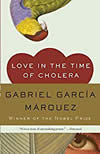 Love in the Time of Cholera by Gabriel Garcia Marquez (October-November 2007)
Love in the Time of Cholera by Gabriel Garcia Marquez (October-November 2007)
On the Norwegian and BBC lists - I delved into this book being wary of it because of the bizarre title, however I found it to be greatly enjoyable. The title really just signifies the time period of the story and not the plot. The book is a love story with a girl whose father tries to get her married above her station and two men who both fall for the girl. The one man is about the same level as the girl and falls head-over-heals for her while the other man is a very prominent doctor who is the supreme bachelor in the community. The story starts off with the woman and the doctor as an old married couple then flashes back to the beginning of the story. The story proceeds to move slowly through the lives of these three people advancing a little on one character then falling back again with another character's story. Marquez does this phenomenally so that you do not even realize that the story changes from one character's narrative to another. Since there is no clear "good guy" or "bad guy", I found myself cheering for everyone, all the while riveted to the book and worried that something major would go wrong. I would definitely recommend this for anyone, especially those in a romantic story mood.
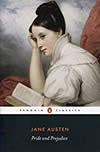 Pride and Prejudice by Jane Austen (July 2004)
Pride and Prejudice by Jane Austen (July 2004)
On the Norwegian, Sybervision, and BBC lists - During the early part of the 1800's there was a series series of books written that could generally be classified as romantic time period pieces. Many of these books were written by women who remain as popular today as the day they were written, especially Jane Austen, who is possibly the most famous of them all. The first of Austen's novels that I dove into, Pride and Prejudice, is possibly her best, if not her most famous novel. The story follows the lives of several socialites, all of varying social classes, trying to woo each other. Austen's writing style is full of whit and satire, and although it is incredibly intelligently written it still remains easy to read, a feat many authors fail at. She manages to take a variety of people, all with various attitudes and mannerisms, and involve them in a believable, yet very funny, series of verbal confrontations ranging from topics of marriage, money, and social class. This is definitely a book on my must read list and my favorite of her works.
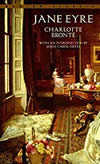 Jane Eyre by Charlotte Bronte (December 2003)
Jane Eyre by Charlotte Bronte (December 2003)
On the the Observer, Sybervision, and BBC lists - Continuing on through my grandfather's book collection I noticed there was a large number of books by Jane Austen and the Bronte sisters. And so I decided to sit down and tackle some of those books. It has been so long since I have read Jane Eyre, I feel that I can't do it justice anymore. This is another of the books I need to go back to at some point. Our title character, Jane Eyre, starts off the story at an orphanage and eventually grows up to live with the famous Mr. Rochester. I almost feel like Mr. Rochester is more of a famous character in modern day society than even Jane Eyre is herself. The book is a fun romantic novel with an air of mystery that definitely deserves another go around for me.
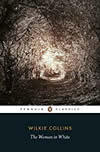 The Woman in White by Wilkie Collins (July-August 2007)
The Woman in White by Wilkie Collins (July-August 2007)
On the BBC and Observer lists - Of all of the books that I have read across these 100 greatest books lists, the genera that is by far one of the least represented is the mystery. Luckily we get an excellent taste of mystery in The Woman in White. The story focuses on a mysterious woman who recently escaped from an asylum. Through the story she crosses paths with the main character, Walter Hartright, and she ends up being intertwined with the plot of several different characters throughout the story despite not always being present in the story. Since this is a mystery I will not give away any of the more interesting plot points (potentially ruining it for people) but I will say that it is a love story and it all turns out well in the end. I recommended this book to anyone who wants to have a fun sit-down with a book, since it is very easy to read, flows naturally, and is enthralling from the get go. The climax seems to come a bit early, but even though the narrative slows down afterwards, it never stops. Overall it is very entertaining and a must read in my opinion.
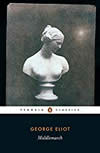 Middlemarch by George Eliot (January - March 2008)
Middlemarch by George Eliot (January - March 2008)
On the Sybervision, Norwegian, Zane, and BBC lists - I rather enjoyed Middlemarch. It started off slow, but as the book went on it picked up its pace rather well. Although the book was the longest I have yet read on this list, about 900 pages, the plot was simple enough that it was easy to follow throughout the entire book. Middlemarch is a town in England where the book follows the lives of the families living there, mainly two different families and their daughters. The book also delves into a lot of conflicts including doctors versus faith, modern medicine versus traditional medicine, and similar subjects. When I started reading the book I had a brief period where I needed to get used to the language being used but it didn't take me very long and afterwards I could easily understand what was going on. I can easily recommend this book as a great story with good lessons, if you are willing to take the time to read it.
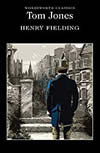 Tom Jones by Henry Fielding (May - July 2008)
Tom Jones by Henry Fielding (May - July 2008)
On the Sybervision and Observer lists - I found that although Tom Jones is a rather long book (my copy was over 850 pages) I greatly enjoyed reading it. The author is more of a narrator than an impartial observer. He readily makes comments throughout the book that makes you feel like you are sitting by a fire listening to him relay the story. It was definitely a different approach than most I have read and I greatly enjoyed it. The story was exquisite. It is about a bastard, Tom, who was abandoned by his mother to be raised by a very benevolent man. Although, I did not readily agree with some of the lessons at the end of the book (like how birth makes more of a difference on who the boy is, not just his character) I still enjoyed it and the ending did bring a tear to my cheek. Throughout the story the author kept making Tom's situation worse and worse and I thought that there was no way to bring him back in a believable manner, but it worked out rather well in the end. I definitely enjoyed this book and recommend it to anyone with a few months to read it.
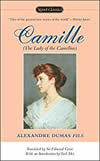 Camille by Alexandre Dumas (April 2012)
Camille by Alexandre Dumas (April 2012)
On the Sybervision list - At first, while reading this book I got the feeling I would have to dredge my way through it like I have through several on these lists. The writing was awkward in the beginning; either that or the translation was poor. Either way, I was not enjoying it. The story seemed rather random and it was kind of dull. But then something just clicked and not only did the reading get easier, the story was much better, and actually pulled me into it. I cared for the characters and was regretting what was bound to happen to them. The premise of the story is that the author comes across the estate sale of a very young (early 20’s) "kept" woman (Marguerite Gautier) (a "kept" woman is basically a high class prostitute) and purchases a book with an inscription inside it. The inscription is by a former love of the woman (Armond Duval) who had given the book to Marguerite as a gift. Days later Armond is at the author’s apartment trying to get the book back. What follows is a love story of what happened between the two people that is very touching, and possibly true. Although I figured out the "catch" towards the end, it did not in the least ruin the story for me and it was written in such a way I think anyone would have figured it out. But on the cover of one of the books it states that Henry James said this is "one of the greatest love stories of the world" and I would have to agree. It is riveting, intriguing, and heart rending, a definite recommend.
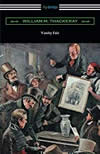 Vanity Fair by William Thackeray (August - October 2016)
Vanity Fair by William Thackeray (August - October 2016)
On the Sybervision and Observer lists - Vanity Fair had sat on my shelf for many years because I was not in the mood for more of the 18th century "romance novels". The kind of novels that were exemplified by the Bronte sisters and Jane Austen's works. They are all right to read once, but too much of that stuff wears me down. I feel there is no real "meat" in those books, just all fluff. Vanity Fair, though, is not one of those 18th century romances. In fact, it is the quintessential opposite in which Thackeray purposely makes fun of those novels. Thackeray's main characters are often vain, selfish, petulant, and immoral. Everything you wouldn't expect from an 18th romance novel. This actually made it a pleasant reading experience. I even laughed out loud at several instances throughout the book. The book is set up as written by someone who is acquainted with the main characters and is narrating their story as a storyteller would. This goes so far as to even have the narrator frequently making reference to the fact that you are reading a book that he is retelling. In terms of story, the main character, Becky Sharp, is not a hero. She is not even likable through much of the story. The only time that she may actually be likable is when you aren't sure if she is being sincere, which I am not convinced ever happens. Although she is the main character, the plot of the story works its way through two main families (the Crawleys and the Osbornes), taking it's leave of Becky when other story lines would take precedent. The plot and time moves steadily on throughout the story with characters coming and going as needed. My main problem with the book, though is that even though the writing is very well done, the story itself is rather dull at times. At over 700 pages long, it takes a long time to work through the narrative. The story could have been trimmed up pretty easily making the pace move a bit faster. I would often get bored of reading the book and need to put it down for a few days because there was nothing drawing me to read more. However, as I moved on towards the end I felt the urge to keep reading build up. Overall, I would say that the story was enjoyable, and funny at times, if not a little bit long winded, but I recommend it nonetheless.
Comedy
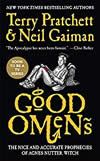 Good Omens by Terry Pratchett and Neil Gaiman (June 2019)
Good Omens by Terry Pratchett and Neil Gaiman (June 2019)
On the BBC list - Good Omens has been on my radar for a while now, having been a fan of Terry Pratchett ever since first starting his Discworld series. And with the beginning of the Good Omens TV show, I was prompted to pick up the book earlier than I otherwise would have done. Pratchett is a very smart and funny writer. He is able to weave political and social commentary throughout his books in a very humorous and sometimes even subtle way and I love him for it. Gaiman, I had never read before, but I am well acquainted with his work. I know he is very knowledgeable about mythology and religion, so I figured this was going to a very good book, both from hearsay and from the authors' reputations. And I was right. The story is about the birth of the Antichrist and the coming Armageddon that shortly follows. The story follows along with an angel and a demon as they try and figure out what is going on. These are not your stereotypical angel and demon. They are flawed and they are fantastic for it. Not only is the story well written but it is as hilarious as I expected. There wasn't a space of five minutes when I wouldn't laugh out loud. Within the plot we follow around several different groups of people as they all come together eventually in the end, for one reason or another. I would say that my only problem with the story was the ending. The story ended too easily. Many of these groups of people didn't really have anything to do with how the story played out. Like, why were they in the story in the first place if they weren't going to have an impact on the story in the end? They felt wasted and it annoyed me a bit to see them tossed aside like they didn't really matter to the story as a whole. Overall, the story is a definite must read. I can see why it has become a cult classic and I can't wait to see the show because I can picture some of these scenes perfectly laid out for television. Even with the ending being a bit 'meh' for me I can still give it my full recommend.
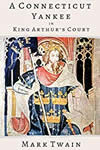 A Connecticut Yankee in King Arthur's Court by Mark Twain (January - June 2014)
A Connecticut Yankee in King Arthur's Court by Mark Twain (January - June 2014)
On the Sybervision List - The previous Mark Twain book that I read, The Prince and the Pauper, was alright, but it left me wanting for the well known wit of Mark Twain. I got that wit in this book. A Connecticut Yankee in King Arthur's Court was everything that I had hoped The Prince and the Pauper would be and more. My only regret is that it took me so long to read because I had more important things going on. The story is written in the first person narrative of a man who is transported back in time to the 6th century from the 19th century. No time is spent discussing how he was transported back in time, which I assumed would eventually be resolved but it never was. Upon being transported back in time, he is almost immediately put to death. How he gets around this is pretending to be a sorcerer, even more powerful than Merlin (who is in this book and is completely incompetent). The Yankee proceeds to "improve" life back in the 6th century, trying to bring it up to "modern" 19th century standards. Twain makes almost everyone in the 6th century appear dimwitted, or even outright moronic, including King Arthur himself. This is not a trait I have seen attributed to these people of legend before and Twain was actually quite convincing in his representation of these characters. The biggest surprise was the ending, which I won't spoil, but I had assumed I knew exactly how the book was going to wind up, but as it turns out, I think I was wrong, but it was rather vague. Just like the time travel aspect at the beginning, the ending was never fully explained. One of the things that took me by surprise, though, was the strong anti-Catholic Church feeling that the story kept bringing back. He even went so far as to try and convert all of England to a Protestant nation back in the 6th century. Overall, a very thoughtful, funny, and insightful book that will happily go on my must read list.
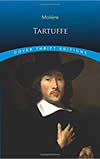 Tartuffe by Moliere (December 2007)
Tartuffe by Moliere (December 2007)
On the Sybervision List - In their essence, plays are written to be performed and not read, so I don't often enjoy reading plays because I don't get the full experience out of them. But even with that caveat, I thoroughly enjoyed Tartuffe, enough so to put it on my personal favorites list. The play only took me about 2 hours to finish and it was very easy to follow along with. The plot is about a rich family where the father takes in a beggar, Tartuffe, and the father dotes on Tartuffe as a beloved son to the exclusion of his whole family. He even pledges Tartuffe to his daughter who is already engaged to another man. Overall, the play is very witty and invokes a pretty good moral lesson and best of all, everything works out in the end.
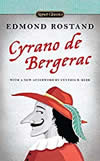 Cyrano de Bergerac by Edmond Rostand (March-April 2008)
Cyrano de Bergerac by Edmond Rostand (March-April 2008)
On the Sybervision List - My wife found a website that sends a portion of a story each day in your email (DailyLit). I thought that I might try it on some of my shorter stories where purchasing the book did not seem like it was going to happen soon. Well after 62 installments, I finished Cyrano de Bergerac and I not only highly enjoyed the story I also enjoyed the daily portions. The story is about an ugly (due to his large nose) but extremely eloquent and proud man named Cyrano who is in love with a beautiful woman, Roxane. Unfortunately, Roxane is in love with another man, Christian, and asks Cyrano to help Christian talk to her. Eventually she falls in love, not with the handsome Christian but with his "soul" that has been expressed through Christian's words and letters, the words and letters written by Cyrano. The story is humorous, heartfelt, and well written. I definitely recommend this to anyone in the mood for a romantic comedy, even though it is a play.
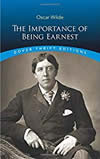 The Importance of Being Earnest by Oscar Wilde (July 2008)
The Importance of Being Earnest by Oscar Wilde (July 2008)
On the Sybervision List - While reading through all of these 100 Greatest Books, there are many which are quick reads and the one consistent thing among the plays is that they are all very fast to get through. You get the introduction, the conflict, and the resolution all within about two hours. The Importance of Being Earnest was even one of the shorter ones, always a highlight for me, and I found it rather funny and enjoyable to boot. The story is about a made-up person named Earnest and two men who pretend to be him. Both of these men end up getting engaged to different women and as you can imagine, hilarity ensues (I had to say that). The play has a very fast paced narrative and the situations are not altogether unbelievable. I rather enjoyed it and will place it on my recommended reading list.
Sci-Fi, Fantasy, Action-Adventure
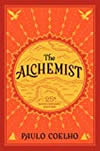 The Alchemist by Paulo Coelho (April 2023) [Book #177/305]
The Alchemist by Paulo Coelho (April 2023) [Book #177/305]
On the BBC list - The Alchemist was actually something of surprise to me. I was expecting a dry historical tale, or something of the sort. However, what I was given was completely unexpected. This is essentially a folklore tale, told as if sitting around a campfire, about a kid who has been given a glimpse of a possible treasure in his future through his dreams and is told to pursue his dreams no matter what. What unfolds is a sheltered youth from Spain who experiences new cultures and new experiences as he transverses across the Sahara in pursuit of his dreams. Although the story does get a bit preachy in parts, it maintains a good balance of preachy to open-mindedness about what is out there and how all religions are different aspects of similar things. The story also emphasizes the reader to follow their dreams, despite hardships that may get in their way, and whatever obstacles may befall them. The path will be easy at the start, but as you get closer and closer to your dreams the path gets more and more difficult, with many opportunities to turn from the path, but if you keep going eventually your dreams can come true. It's a fairly uplifting and heartwarming tale and one that has a surprising bit of humor in it despite the negatives that befall the main character. Even as he gets disheartened at times he always finds himself in pursuit of his dream/ And there lies an analogy to the reader that as times get difficult, it just means you are getting closer to your dreams. This is a story that I can't help but recommend because not only is it short (a favorite feature of mine), it's fun and I could barely put it down.
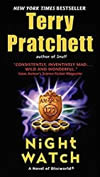 Night Watch by Terry Pratchett (June-July 2022) [Book #172/305]
Night Watch by Terry Pratchett (June-July 2022) [Book #172/305]
On the BBC list - Night Watch is the 29th book in Terry Pratchett's Discworld series, with several other books having also made it onto the BBC 100 Greatest Books list including The Colour Magic, Mort, and Guards! Guards! Having started the first book of the series (The Colour Magic) I have slowly been working my way through all of them so that I could read them in release order, having finally gotten to Night Watch. Throughout the first 29 books (totaling more than 40 in the series), there have been multiple story lines that have appeared with many of the books having absolutely nothing to do with any of the other books except that the location was on the Discworld. Of these varying storylines, Night Watch is the 6th book focusing on the Night Watch, a series of books that began with Guards! Guards!. Having read them all (up until this point) I can say that the Night Watch novels have not been my favorite of the bunch, but they have generally been enjoyable. This book, however, was quite different from all of the preceding stories. Generally the books are about the Watch as a whole, led by Commander Vimes, with many other Watchmen included in the mix. The number of different Watchmen slowly increasing over the course of the series. And while you don't need to read the entire series to understand and enjoy the books, it definitely does help when character names are mentioned and previous plot points pop up here or there. In fact this entire story starts with the murder of a Watchman (off screen), which we had known from quite a few of the previous stories. We are quickly time traveling with Vimes (through the use of magic) to back when he was a young recruit in the Watch and his history takes an interesting turn. Although my feelings on the Watch novels are generally so-so, this one felt so different from the others that I did greatly enjoy it. It was new and fresh but with many of the same characters we had seen introduced in a wide array of the previous books. And although the Discworld books are generally satirical, I felt that this one was more serious in nature. Pratchett's writing is still spot on and hilarious at times but I felt he was more going for a serious narrative and one that he hit amazingly well. This is likely one of the best of the Discworld books and one I would definitely recommend. I feel that even if you were to read this book without all the backstory from the other books there isn't much you would be missing. Highly recommend.
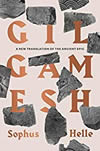 Gilgamesh by Anon (May 2022) [Book #171/305]
Gilgamesh by Anon (May 2022) [Book #171/305]
On the Norwegian list - Gilgamesh is one of, if not the, oldest story known today. Written at least 4,000 years ago, it was originally found on a series of clay tablets in the cuneiform language. When originally discovered, we had not yet cracked the cuneiform code and therefore the story sat without us knowing what we had. Roughly 150 years ago linguists cracked the cuneiform code and the story of Gilgamesh was slowly realized and spread out among the world. So despite it being likely the oldest story we have today, it is still fairly young to modern literature, as opposed to The Iliad and The Odyssey. Written as an epic poem, Gilgamesh has not faired completely unharmed through the ages. The story itself is littered with missing words and whole sections of the story just missing. These gaps represent where tablets were illegible or even completely broken apart. The gaps cause a lot of the story to remain unknown, however, luckily, the story has a tendency to repeat itself. A lot. This allows us, as the reader, to potentially piece together many of the missing sections. The repeated sections also adds to the theory that this was originally meant to be presented in front of a live audience. Unfortunately though, the many, many repeated sections in written form have a tendency to get glossed over by the reader. The story itself tells of the ancient Mesopotamian king Gilgamesh who stands over 18 feet tall. Across the 12 known tablets, Gilgamesh battles the guardian Humbaba, he makes some friends along the way, and eventually becomes part of the tale of a great flood sent by the gods to inundate the world. There is even a boat that needs to be built in order to survive the flood (with specific building measurements given). This story, although near identical to the biblical account of the flood, was written over a thousand years earlier resulting in a very interesting history lesson. Overall I found the story of Gilgamesh to be alright on its own, however I found the most fascinating part was the history behind the story and all the contexts interlaid within the story itself. I highly recommend the Sophus Helle translated version, which includes essays about the epic and provides much needed context about various parts of the story. Being the foundational work of essentially the civilization that followed makes me want to recommend this work to everyone.
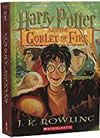 Harry Potter And The Goblet Of Fire by JK Rowling (June-July 2019)
Harry Potter And The Goblet Of Fire by JK Rowling (June-July 2019)
On the BBC list - Harry Potter and the Goblet of Fire is the fourth and final Harry Potter book on my 100 greatest book lists. Up until this point, all of the Harry Potter books have been on the BBC Book list, which was chosen by a UK popularity vote in 2003. This also tells you why some of the other Harry Potter books did not make the cut, since they were not published by that point. Looking at the BBC Book List, the first 21 books have been ranked according to popularity with only one book per author appearing in the top 21. That is the reason books 22, 23, and 24 are all Harry Potter with this book taking the prize at number 5. So, by popular vote, book 4 was chosen as the best of the first four books of the series and I whole heartily agree with them.
Rowling has moved beyond the issues that plagued the first two books and worked this book into a fantastical masterpiece that will survive long into the future. The plot is riveting and the pace of the book is remarkably easy to flow through. The language used helps it to stay in the "teen lit" category but that just means that more people can enjoy it, it is not a knock to the content. The pattern of the novels was also mixed up a bit for this one, where the quidditch matches which were used as the background events helping to propel the finale of the story forward were discarded for an overarching Olympics type event. This tournament resulted in some real stakes for the characters where not everyone was left unscathed. It made the books very suspenseful and very difficult to put down. To top it off I had not seen this movie for several years, perhaps not even since it came out, so the overall plot and the surprise twist at the end completely caught me off guard. Needless to say I loved it and this is by far my favorite of the Harry Potter novels.
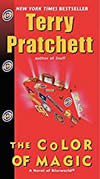 The Colour Of Magic by Terry Pratchett (February 2011)
The Colour Of Magic by Terry Pratchett (February 2011)
On the BBC list - I started reading this book because I was looking for something easy to read and I noticed that all of the Terry Pratchett books were pretty cheap for the paperbacks so I picked up all 4 on the list. I was going to start with Mort until I realized that these were books all within a series of books called the Discworld series, and The Colour of Magic was book #1. It turns out that this is a fantasy series that takes place in a realm where the planet is a flat disk on the back of four elephants whom stand on a turtle. Other than that, something you may need to know is that magic is a major component of the story. But all in all, I really, really enjoyed it. His humor is a bit off, and not always what you would expect, which is what makes it even more enjoyable. The type of humor reminds me of Futurama in which, at one point the main character asks if anyone else tastes purple. That is the sort of thing you could expect from The Colour of Magic. The story in this book follows the exploits of a failed wizard and a tourist from a distant continent. I would actually really recommend this book, and likely this series which contains about 40 books, however I haven't read any further into the series as of yet. Although, now I personally will have to read them in order, even though the books on this list jump around a little bit. But for those who don't want to read all the books in order, the author has stated that the individual stories should stand on their own. Generally, I would probably recommend this book as the first one you read since it gives a pretty good introduction to the realm in which it takes place.
 The Lord Of The Rings by J. R. R. Tolkien (January - February 2005)
The Lord Of The Rings by J. R. R. Tolkien (January - February 2005)
On the Observer and BBC lists - Following The Hobbit, I dove headfirst into the tome that was The Lord of the Rings. Although it is often listed as a trilogy of books, my book list treats it as a singular novel, and really that was what it was meant to be. Looking at the detail that Tolkien puts into this world, it is absolutely incredible. For a book that took ten years to write, you can tell. The story is so in depth and the languages that were created so complete that you can almost feel like this is an actual world. Word of advice, I recommend that you read it like I did. Read The Hobbit first, then expand into this book because The Hobbit flows into this book. Also, watching the movies after reading these books gave me so much more insight that upon first viewing I missed. The characterization in these novels is some of the best I have ever read. I love stories that tie back into a whole wider universe. This novel alone had urged me on to explore all of the Tolkien stories tied together, from The Silmarillion to the Lost Stories. If you don't like fantasy novels this might not be for you, but it is dead center of my alley. Overall, the book is fantastic, you just need to read it to appreciate it. Definitely on my must read list.
 The Hitchhiker's Guide To The Galaxy by Douglas Adams (March 2005)
The Hitchhiker's Guide To The Galaxy by Douglas Adams (March 2005)
On the BBC list - Continuing on my "I'm going to read some "funner" books on this list" trend, I dove into my first outright humorous book. Prior to this I was not much accustomed to "British humor", having not watched much of British comedy shows or movies before. But afterwards I became a convert. I thought this book was absolutely hilarious, and I could not stop laughing through the whole thing. Just thinking about it now makes me want to dive back headlong into it. The plot follows one man, Arthur Dent, as he gets transported off Earth just as it is about to be destroyed. We follow along as he is shuffled around the galaxy just trying to figure out what is going on. I loved this book so much that I continued on through the next four books (making what Adams called "the longest trilogy in the world"). These books also continue the plot-line and are a great fun to read, although the final couple of books in the series start to get a bit bizarre (even more bizarre if you will) and deviate from the original plot-line of the story. This is definitely on my list of books to read, and if you have time, read the entire series.
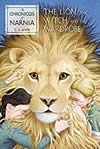 The Lion, The Witch And The Wardrobe by CS Lewis (May 2005)
The Lion, The Witch And The Wardrobe by CS Lewis (May 2005)
On the BBC list - Continuing on through my fantasy kick, I decided to hit up one of the hallmarks of children's literature, The Lion, the Witch and the Wardrobe. However, I like to read stories in chronological order even if they were not originally written in that order, so I started with the first book in The Chronicles of Narnia series (chronologically), The Magician's Nephew. This gave me a different perspective on The Lion, the Witch and the Wardrobe than I'm sure a lot of normally get by only reading that one novel, or reading them in release order. The Magician's Nephew gave me a background on a lot of the features seen within the novel, not the least important being the lamppost. The story of The Lion, the Witch and the Wardrobe follows a group of kids who find themselves in another world by going though a magical wardrobe. Once in this magical land of Narnia, they are drawn into an all out war of good versus evil. Being a "kids book", means that the book is very easy to read (you can breeze right through it) but it is still enjoyable for all ages. My biggest peeve about the book, though is the overarching religious themes. In this original story they aren't as blatant, but as you get into the later Narnia books it becomes pretty oppressive. Definitely on my must read list though.
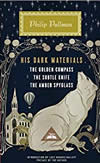 His Dark Materials by Philip Pullman (June - July 2006)
His Dark Materials by Philip Pullman (June - July 2006)
On the Observer and BBC lists - His Dark Materials has quickly become one of my favorite stories of all time. The series is absolutely enthralling, not letting me put it down for a moment. And it is one of the few series I have returned to time and time again. The story can be considered a cross between The Chronicles of Narnia and The Lord of the Rings, where the world building is a bit less in-depth than LotR and much less preachy than Narnia. I find it a cross between the two stories that takes the best of both worlds. The story is about parallel universes, where the primary character, Lira, is a kid with a physical manifestation of her soul literally on her sleeve; or running all around as the case may be. Lira starts out being a very young kid with little worldly experience, who, over the course of the story, grows into the hero the story needs. I have often heard criticism that this series is like the "atheist's bible" or some nonsense like that, and I find that surprising as this book is actually very spiritual. It is very anti-organized religion though and that could be a bit off-putting to some. I found the story to be a well-written and fast-paced read (about 1000 pages in 2 weeks), where in the end all the plot lines got wrapped up neatly. Although, I do disagree with how it ended, but looking back on the story there was really no other way it could have gone. This is obviously a must read for me and one I have often recommended to a lot of people.
 Dune by Frank Herbert (December 2006)
Dune by Frank Herbert (December 2006)
On the BBC list - Dune is often cataloged as one of the greatest science fiction stories ever told and the precursor to all science fiction that has come since. It is also frequently listed as the first book within the bestselling science fiction series of all time. These are all titles that the book has rightfully earned. Dune contains parallels in religion, politics, and environmental changes to modern day society, even when it was written back in the 1960's. The story takes place in our the distant future (at least 20,000 years) and the only concrete evidence that it even takes place in our universe is a quick mention of Earth in the appendix. We follow a 15 year old boy who turns out to be the prophet that a culture of desert dwellers has been anticipating. He then must not only learn to live in the harsh environment but to use his "magical" gifts properly. I recommend this book because not only is it the precursor to all modern day science fiction stories but because it is riveting and extremely well written. It is a bit of what is classified as "hard science fiction", meaning that there is a lot of science and not much of the more fantastical elements, but it is still a riveting story none-the-less. My only problem is now I have this urge to read the rest of the series.
Mystery
 Rebecca by Daphne Du Maurier (August - September, 2024) [Book #181/305]
Rebecca by Daphne Du Maurier (August - September, 2024) [Book #181/305]
On the BBC list - I went into Rebecca having high hopes. It is in the top 21 books on the BBC Big Read list and several of my friends commented how fantastic a book it was when I started. So, although I don't like to have expectations going into a book, I definitely had mine. And they were beyond exceeded. Rebecca is a mystery novel, with most of the plot taking place as a flashback in the first person perspective of the central unnamed viewpoint character. Our main character is a servant of a less than ideal person when she meets this mysterious man, Maxim de Winter, whom she falls in love with and ends up marrying over a very short time period. Afterwards she is swept away to his mansion, Manderley, where she is thrust into the world of the aristocratic, complete with a whole host of servants whom now wait on her. The only problem is that there is something that falls over everything that our main character does in the story, and that's the shadow of Maxim's recently dead wife, Rebecca, whom was adored by nearly everyone. I was not prepared for the many twists and turns that the story took. While there is a sense of dread over the entire book, you kept waiting for the next shoe to drop, and each time I was surprised. The only one I caught on to before it happened was the final one as the book came to a close, but even that one had me flipping back to the first few chapters, before the flashback, to see how the story ties into them. This book was just so much fun to read. And while the story did drag a little bit in the middle, I feel that the story, and how the text just flowed off the page, made this by far a fantastic page turner. It is a definite recommend from me.
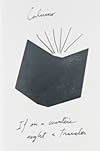 If on a winter's night a traveler by Italo Calvino (May 2020) [Book #164/305]
If on a winter's night a traveler by Italo Calvino (May 2020) [Book #164/305]
On the Observer list - If on a winter's night a traveler has to be one of the most unique books I have ever read, especially on this list. When thinking about how to categorize the book, I found it very difficult to place it within any category, however if push came to shove I would say that this is a mystery. The mystery for the story is that the main character, often just called the Reader, is trying to find the conclusion of story that he started reading but was missing from the book. During the process he discovers another Reader, whom he teams up with and they end up trying to hunt down the missing text together, only to come across a whole host of uncompleted books. The weird part about the story, is that at times the book is written as if it were talking to us, the audience. But at other times the author treats the book as a book, with the characters acting as one would normally act within a book. It's weird. Chapter one of the book started off so unexpectedly that I had to check a few times to make sure I wasn't reading an introduction:
"You are about to begin reading Italo Calvino's new novel, If on a winter's night a traveler. Relax. Concentrate. Dispel every other thought. Let the world around you fade...."
But after some flipping around the book I soon discovered that, yes, this is indeed how the book is going to go. I thought it was going to be a rather meta reading into the book, when it ends up shifting topics part of the way through, and eventually morphs into that mystery I mentioned. Although it does play with the meta part quite frequently, delving into what you are reading and treating the story as if that is what the Reader is discovering about the book he is hunting for. It feels almost as if this book were written for authors, and that authors would be the ones to get the greatest enjoyment out of it. But otherwise the text was extremely easy to read, at least in the translation I was using. I found I was able to read this book for longer periods of time and at a much faster pace than I am with many of the books on this list. The book was also fairly short, only about 250 pages. So, all in all, a definite recommend, especially for the unconventional nature of the story.
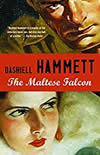 The Maltese Falcon by Dashiell Hammett (May, 2010)
The Maltese Falcon by Dashiell Hammett (May, 2010)
On the Sybervision list - I know that the movie was based off of the book but it had been so long ago since I saw the movie that I don't remember any of the plot points. This was good because it didn't end up ruining any of the book for me. The movie, and a lot of similar rip-off movies, have the same motif, they contain this old detective feel; a black and white movie with the main detective doing a voice-over for much of the movie. That was exactly how this book read. It was like Humphrey Bogart was reading the book aloud to me in my head. I really enjoyed it though. It was different from most of the other books I have read and it was a constant page turner where you must know what was going to happen next. The story was not too complicated, your basic murder mystery plot, a who done it and why sort of ordeal. Overall, it was a quick and easy read and I feel that everyone should read this if they are in the mood for an good old time detective story.
Historical Fiction
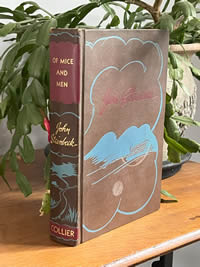 Of Mice and Men by John Steinbeck (1994 and 2025) [Book #1/305]
Of Mice and Men by John Steinbeck (1994 and 2025) [Book #1/305]
On the Sybervision and BBC lists -While I had read this book in high school and I consider this the first book I have read on my list, I have since gone back and reread it. And my, what a depressing story this is. It has a very strong Great Depression vibe to it as well, although the Great Depression is never mentioned in the story. The plot follows two companions, one of which would be considered to have a learning disability today, Lennie, while the other individual, George, is the one that takes care of him and tries to make sure he doesn't get into trouble. Which doesn't always work out the way that he hopes. While the story is very short and follows only one instance of them as traveling farm hands to a new farm, the story itself delves into racism, ableism at the time, and in some instances men's mental health. It is a profound reading experience coming at it from a 21st century mind frame. I don't think I got anywhere near all those details in high school and this is one I was happy to travel back to. A must read in my opinion.
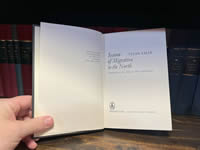 Season of Migration to the North by Tayeb Salih (February 2025) [Book #185/305]
Season of Migration to the North by Tayeb Salih (February 2025) [Book #185/305]
On the Norwegian list - I believe that Season of Migration to the North may be the first book I have read that was originally written in Arabic. And this book almost makes me want to understand Arabic because the prose was so beautifully written that I can imagine it would be tenfold better in the original language. The story is about a man, the narrator, who encounters a stranger in his community, Mustafa. From that point forward, Mustafa's history becomes of paramount importance to the narrator, so much so that Mustafa has some degree of influence over the narrator, as well as many other people. I really enjoyed this book. The prose is wonderful and the story is engaging. There were a few parts that had me squeamish and I'm not how how much of them were related to the Arabic culture of the time (set in the 1920's, published in 1969) or how much of it was just inclusions by the author. I imagine a bit of both. The treatment of women in the story was also heavily dated, but also surprisingly progressive in many ways. However, with all that aside, this book has left me with many questions about the story and Mustafa's influence, which, while the story appears to address, I don't believe the author fully answers. Leaving a bit of a mystery especially once the ending comes about. Overall, I'd say this is a must read.
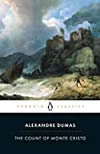 The Count of Monte Cristo by Alexandre Dumas (Januray - March 2023)
The Count of Monte Cristo by Alexandre Dumas (Januray - March 2023)
On the BBC and Observer lists - The Count of Monte Cristo actually ended up being one of the longer books that I have read at 1,200 pages, which doesn't seem that long compared to some books, but this was a densely typed up book for those 1,200 pages. And although it was very long, and took me three continuous months to read, I actually greatly enjoyed it. The story follows Edward Dantès, who gets accused of a crime and locked away for many years. While in solitary confinement he befriends an abbe who is also locked up and helps him to not only escape but how to unearth a vast treasure. Upon his escape he plans meticulously at retribution against those that have wronged him. And while the story could potentially get tedious, it never actually does. It remains fresh and enjoyable throughout. The beginning part of the story takes place during the exile and eventual return of Napoleon, a period of time in French history that I am not as well acquainted with, and I found this little insight from the French point of view fascinating and how these events helped shape what the story became. My favorite parts were towards the beginning, while he is in prison, but even the latter half that turns into a Jane Austin novel, are also remarkably fun and enjoyable. My biggest problem was just keeping everyone straight and who did what to who and how they all are related to Edward, or the Count of Monte Cristo, as he eventually became known. Overall, this was an excellently paced novel and very well written, and I am putting it on my personal greatest books list as a recommend.
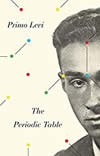 The Periodic Table by Primo Levi (September, 2019)
The Periodic Table by Primo Levi (September, 2019)
On the Observer list - Starting out this book was an enigma for me. I initially assumed it had something to do with the formation of the Periodic Table. Then upon reading a general book description I was immediately expecting an autobiographical account of a Holocaust survivor similar to Elie Wiesel's Night. This was nothing of the sort. I think Levi best sums up the book in his own words towards the end of the book:
"...I was in search of events, mine and those of others ... to see if I could convey to the layman the strong and bitter flavor of our trade (as chemists).... I was more interested in the stories of the solitary chemistry, unarmed and on foot ... who confronted matter without aids, with their brains and hands, reason and imagination."
That is in essence what the book was about. It was a series of stories, some of them assumed to be autobiographical, and some of them clearly not, all within a framing story of a different element. Each chapter was laid out with the title of that element and the story that followed had something to do with it. Levi was a Holocaust survivor, however his trials during his time in the camps were largely left out of the book. He mentions them as being memoir-ed in other works of his so they were skipped over here. It was like a series of bedtime stories, with a thread that worked it's way through the whole book. More often than not, I hate short stories. But this book didn't work in that way. It worked as a narrative. His various other stories, outside of his autobiography, added heart and soul and a realness to the book by sometimes being a bit fantastical in themselves. The book was surprisingly funny and upbeat, despite the dire circumstances at times, but it was also moving and sentimental. You don't find out much about Levi's personal life, except in relation to the elemental story he is telling at the particular moment. The best part of the book had to be the Chromium chapter, which was surprising and hilarious, and a pretty much self contained story within the greater narrative. Overall, I would say this was a fantastic, engrossing read. The only weak part was the first chapter which felt like a drudge to get through with all of Levi's relatives ever listed out, who never reappeared in the story at all. But once you get past that part the rest was smooth sailing.
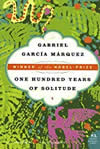 One Hundred Years of Solitude by Gabriel Garcia Marquez (June-July 2019)
One Hundred Years of Solitude by Gabriel Garcia Marquez (June-July 2019)
On the Observer, Norwegian, and BBC lists - I found myself constantly comparing One Hundred Years of Solitude to Marquez's other work on the list that I read almost 12 years ago, Love in the Time of Cholera. You can definitely get a feeling for Marquez's style between the two books. I have to say though, that between the two, Love in the Time of Cholera was a much easier book to get in to, but One Hundred Years of Solitude was the more impactful. To sum it up One Hundred Years of Solitude was fascinating, horrifying, hilarious, depressing, intriguing, and by the end, I couldn't put it down. The story is about a fictional South American town named Macondo that was founded by the couple José Arcadio Buendía and Úrsula Buendía. Within the story we follow the development of the Buendía family, and despite how large or small the town gets, eventually turning into a thriving metropolis, we never really feel that because of the focus on this family. However, the family mirrors the effects of the town; as the town grows, so does the family, as the town shrinks, so does the family. One of the first things we learn about the family though is that there are issues with the family, specifically incest, which comes up again and again, which is one of those things that is rather horrifying in the story. The story, though, is about cycles, and how everything changes, yet everything stays the same.
One of the hardest parts of the story to get through was the names of the characters. The story was written where time kind of bounced all over. Even the first sentence of the book begins with an illusion to what would happen halfway through the narrative. But the names of the characters were all either identical or very, very similar, making keeping track of who was who extremely difficult at times. By the end I still couldn't remember who was who's daughter/grandmother/aunt. But it works in the context of the story. The Buendía family is constantly making the same mistakes, constantly rehashing the same issues, through several generations, and by renaming their kids after either the patriarch José Arcadio or Aureliano (I believe there was at least 22 Aurelianos mentioned by the end of the story), it got to be rather confusing. This was not an easy book to read because of that. I could only read about 20 pages a night because I kept having to go back and rereading to figure out who was who as time slowly marched on through the story, bouncing back and forth as it went. The chapter breaks generally covered a different person within the generations as they progressed through life as well. So by the time I got to the end of the story, I immediately wanted to jump back to the beginning to see how it all tied together. This is a definite reread story, to catch all the hints about later parts of the story in the earlier sections. It is a story about time, where time doesn't seem to be happening. It is a fascinating tale and a definite one on my must read list, but it is work to get through, if you want to get everything out of it.
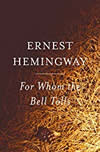 For Whom the Bell Tolls by Ernest Hemingway (1997-2000 Large gap in reading times)
For Whom the Bell Tolls by Ernest Hemingway (1997-2000 Large gap in reading times)
On the Sybervision list - I started reading For Whom the Bell Tolls the summer before 11th grade for a class where we had to pick our own book to read over the summer. Unfortunately, I never actually finished the book for class. Fast forward three years and I was sick with mono during the end of my freshman year of undergrad and I clearly had nothing else to do so I picked the book up again and finally finished it. For Whom the Bell Tolls made me a Hemingway fan for life. I don't recall the reason I initially picked it up but I had loved it ever since. It is one of those books I need to go back to and rediscover, it had left such an impression on me as a kid/adult. The story follows an American soldier in the Spanish Civil War. Within the narrative there are the four main characters, all with their own opposing viewpoints on war and morality, and they question whether this, or any, war is really worth fighting. The ending has stuck with me to this day and I can picture the events within my head. It has a very Soprano's ending, for anyone who was a fan of that show. This story is definitely on my list of best books.
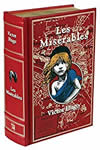 Les Miserables by Victor Hugo (April - May 2006)
Les Miserables by Victor Hugo (April - May 2006)
On the Sybervision list - I grew up attending the musical version of Les Miserables and I was always thoroughly confused by the play. I enjoyed the music but the plot of the musical confounded me. After having seen the musical three or four times, I decided to delve into the book and I must say that this book was absolutely enthralling. I have since seen the musical after having read the book and it makes much, much more sense now. The story is two fold, one following the social unrest of the French Revolution following the fall of Napoleon at Waterloo, the second follows an ex-convict, Jean Valjean, while he tries to redeem his life. The book meanders a bit in its plot, but overall I found it fantastic. I was lost in the depths of Hugo's Paris and I didn't want to find my way out. Many times when an author goes on random tangents (like Melville) I get bored and want to move on with the story. This was different for me. Hugo paints such a wondrous portrait that I want to delve back into it time and time again. This is definitely on my must read list and is perhaps one of my favorite books of all time.
 Song of Solomon by Toni Morrison (December 2007 - January 2008)
Song of Solomon by Toni Morrison (December 2007 - January 2008)
On the Observer list - I rather enjoyed Song of Solomon, however I am not sure if it should go on my personal must read list. It is rather vulgar through most of the story but it tells a very good tale. The story is partly about a black man living in an intolerant society. I read comments elsewhere that this is a work about living as a black person during the early 20th century, but I do not feel that is the primary story being told. The deeper story is about a man learning about his roots (his people) and learning that family is more important than anything else. The flow of the story carries it along at a great pace and you never know what might happen next, but it all works in the end. Alright, I will put this on my list but with a warning: the story has very harsh language, however it is used with a purpose and fits into the story very well.
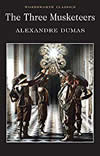 The Three Musketeers by Alexandre Dumas (June-July 2016)
The Three Musketeers by Alexandre Dumas (June-July 2016)
On the Sybervision list - After having read several books on the list that were either partially or entirely a drag to read, it was a tremendous surprise to find out how much I really liked this book. The Three Musketeers is actually very easy to read and I swear, it feels as if it could have been written today. However, this is not one of those books that has a higher intellectual purpose. This is an action/adventure flick in book form. It goes from one action "scene" to the next all the way to the end. The story follows a man named D'Artanian, who, at the being of the story, was not a musketeer. Shortly he befriends three men who go by the names Athos, Porthos, and Aramis, which are the entitled Three Musketeers. The funny thing about this story though is that it really isn't about the three musketeers at all. They are supporting characters at best, and in the case of Porthos, he is even called out in the story as almost superfluous. Even with this, it doesn't detract from the story at all, and there are several instances where different character's fates were not what I was expecting at all (and if this was written today would have been completely different in my opinion). There were a couple of things that didn't work for me. The main one was the long winded section where Milady is describing her past and how she got to where she was at that point in the book. The problem is, all of that story was a lie, and the reader knew it was a lie while she was giving the story. So, it felt like a complete waste of the reader's time, which is already being taken up for a while with this around 600 page book. But besides that, I ripped through this book faster than I have read a book in a long time. This is a definite must read in my opinion.
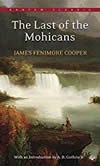 The Last of the Mohicans by James Fenimore Cooper (January 2017)
The Last of the Mohicans by James Fenimore Cooper (January 2017)
On the Sybervision list - I am conflicted about how I feel about The Last of the Mohicans. In one respect, this book is beautifully written with prose that just oozes with descriptions giving the reader a wonderfully rich experience that isn't overly cumbersome to dive through. On the other hand, this book is horribly racist towards Native Americans, displaying them as "brutal savages" who don't know any better. It is possible to view this book as a product of its time. If this were written today, it wouldn't make it passed the editor's office before being rejected outright. However, at the time it was written, this is how people thought (I assume). It's not even all of the Native American's which are depicted as moralless savages, but they are all given pretty short shrift. I enjoyed the book though, once I was able to get beyond that. The story is basically divided into two parts. The first part is about a group of "white people" trying to make it to Fort William McHenry on Lake George in New York with the help of the last two Mohicans. I know this area very well, since some of my family is from there and I've been to this fort. So this part of the story was fun for me. I could picture the scenes in my head. However, the story was also rather confusing at times, especially keeping all the people straight. Cooper calls the main characters and tribes by different names frequently and alternates with just the first names or just the last names to the point that it took me about 100 pages before I was certain who was who and how many people were actually in the story. In the second part of the story, the group travels up north and I won't go into any more for the risk of spoiling it for someone who may be interested in reading it. I found the ending though very satisfactory and the author didn't pull any punches. Overall, even with the poor representation of the Native Americans, I think this was a very well written, good story. It plays more as a historical reenactment than a work of fiction, and I think that is what helped me get through the more racist elements. So I feel that I can recommend this book.
Drama
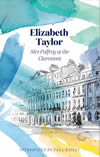 77. Mrs Palfrey at the Claremont by Elizabeth Taylor (February - March 2024) [Book #179/305]
77. Mrs Palfrey at the Claremont by Elizabeth Taylor (February - March 2024) [Book #179/305]
On the Observer list - In general, Mrs Palfrey at the Claremont took me by surprise. It is a fairly short book, with the version I read being just under 200 pages, which is what prompted me to read this book on my list; a quick break while I read through a much longer book. The premise of the story is about an older woman, Mrs. Palfrey, who was looking for a place to live while she was no longer able to, or no longer wanted to, live on her own but had not yet reached the stage of needing a nursing home. The Claremont then became her home, a hotel with a bunch of long time residence, mostly all older in age. One day, while she was walking home, she slips outside a young man's apartment, Ludo, who helped her up and eventually became the replacement for her negligent grandson. And this gets to the core of the story. Mrs. Palfrey is living a lonely existence. Her daughter and grandson have essentially abandoned her and she has no one. And while loneliness may seem at the heart of the story, it was also a rather funny story. Making this a seriously hard book to peg down. I had laughed out loud during several instances of the story. The core of the story is about how older people just kind of get ignored in our society (even back in the 1920's when this takes place) and left to their own devices, forgotten and ignored. But they aren't the only ones. Ludo was also dealing with his own loneliness. As well as all of the characters. They all had their own "things" they were dealing with, leaving everyone to feel all by themselves. As the story wrapped up, it ended with a profound sense of loss and sadness in a situation that I don't wish on anyone but I know countless people go through everyday. The book was excellently written and a joy to go through, with each heart breaking moment counterbalanced with a laugh. I have to recommend this book because it was so, so good. But in the end, it definitely was not an uplifting story at all, but an accurate one about life. Also note that Mrs Palfrey at the Claremont is not written by the actor Elizabeth Taylor, but the author Elizabeth Taylor, who are two distinctly different people (as far as I can tell).
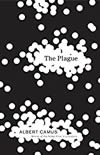 The Plague by Albert Camus (May 2022) [Book #170/305]
The Plague by Albert Camus (May 2022) [Book #170/305]
On the Observer list - Despite this book being added to a 100 greatest books list that was compiled in 2003, it is more perfectly timed for right now than any other book I have read on any of the lists. It feels as if it were made for the "post Covid times" (whether we have reached that yet or not) and fits into the narrative that we all have been living for the last two years. Based on the cholera epidemic of the 1800's, the book takes place in the French Algerian city of Oran during the 1940's (I assume post WWII). The story starts off with first hand accounts of rats dropping dead all over the city and proceeds from there into full lockdowns and hospital clinics being overwhelmed. You can physically match the trajectory of the story to the Covid pandemic (without the rats) and as each phase was entered in the story I was able to place that in our own timeframe. With the narrative set up through the use of first hand accounts and journal articles it also feels phenomenally like World War Z, however the similarities do diverge as this story progresses and the reliance on journal articles and first hand accounts is not as pronounced. The entire story is also guided by an unknown narrator, whom we find out who is at the end of the story. It is an enjoyable story and one I would actually recommend, more so now than probably I would have 3 years ago.
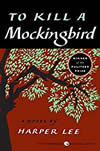 To Kill a Mockingbird by Harper Lee (October - November 2015)
To Kill a Mockingbird by Harper Lee (October - November 2015)
On the Sybervision, Observer, and BBC lists - Typically, when I am reading one of the books on this list, I am usually thinking of what I am going to say as a review, at least during the last quarter of the book. However, for To Kill a Mockingbird, I had to wait a couple of days until after I finished the book. I had burned through it so quickly, and I'm still having a hard time putting together my thoughts. The book follows the life of a young girl, Scout Finch, living during the depression in a small town in Alabama. As is true with most children, she is inquisitive and playful and the book follows her through her games and exploration of the world around her. She has a mysterious neighbor, who the children are bent on tormenting, even though they have never seen him. An interesting story point that does come to fruition by the end of the story. The main point of the book however is regarded as background material throughout the first portion of the book. This story element, like many in the book, slowly reveals itself through the natural course of storytelling. Scout's father, Atticus, is a lawyer and is charged with defending an African American man accused of raping another man's daughter. How the story manifests itself through the eyes of Scout is truly remarkable. Several times throughout the book I felt myself well up at the sheer impact of the story. I'm not sure if it is because I am father of a young girl and I can place myself in Atticus's shoes at times, or not. But this is truly an emotional novel about race relations during the Great Depression, and how far we had to go at the time. The writing couldn't have been easier to follow, and the descriptions were truly outstanding. Harper Lee's descriptions would often flow through the story, not being placed at any particular point, but would appear as natural eddies in the narrative.This resulted in me flying through the novel, reading half of it in one day. This novel has easily ascended to become one of my favorite books of all time, well within my Top 5 favorites.
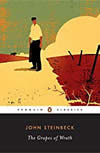 The Grapes of Wrath by John Steinbeck (August 2015)
The Grapes of Wrath by John Steinbeck (August 2015)
On the Sybervision and BBC lists - Often, when I start out reading a book, I set goals for myself, such as 10 pages a day, or a chapter a day. The purpose for this is to keep me on pace and finish in a reasonable amount of time. I had done that with The Grapes of Wrath as well, setting my pace at 20 pages per day. One of the first things I noticed about the book, though was how easy it was to read. Twenty pages would fly by and I would keep on going, partially due to the ease of reading the story but also because I had become enraptured with the characters and the story. My page goal almost became a moot point, with the story drawing me along. The story is about a family from Oklahoma during the 1930's dust bowl, who believe they will find better fortune in California after being run off their land due to unpayable debts. And that is it. The family moves around during the Great Depression trying to find work and dealing with the situations that are happening all around them. This story became a cultural and political wake up call to the US government about how bad conditions had become in the country. I don't believe Steinbeck set out to write a social commentary, mostly because the worst of the things that happened to many of the migrants happened only to the auxiliary characters, or were isolated to portions of the text not following the main plot. In many instances the main characters thrived in situations where a normal person would have been dealt a bad blow. They managed to get into camps that just happened to have an opening, or find ideal jobs when others are getting half the pay they get. I felt that Steinbeck played it safe with his primary characters in instances where today an author might not. It was the ending that really got to me though. Reading through this whole novel, I started to wonder where it was going. I felt that the characters could go on in this fashion for a long time, but clearly the novel is drawing to a close. It is when I hit the final two pages that I realized where Steinbeck was going. The ending provides the quintessential essence that the new generation must support the old, because they have become unable to do it themselves. The layout of the story was interesting, with every other chapter focusing on the main characters and the other chapters giving a parallel story not focused on the main characters, but written as a commentary on the social problems of the time. Overall, I felt the writing was fantastic, which produced a smooth read through of a fantastically well-written story. A high recommend.
 Don Quixote by Miguel de Cervantes (January - June 2015)
Don Quixote by Miguel de Cervantes (January - June 2015)
On the Sybervision, Norwegian, and Observer lists - Whenever I hear anyone reference Don Quixote, it is frequently in regards to his fighting windmills, or riding around on an old horse with a fat squire on a donkey. Well, that is pretty much the first 20-50 pages of a 1,000 page long story. Preconceptions of the story do not really encompass the true breadth and depth of it. The story is about a man who feels he has been tasked with restoring knight errantry back to Spain and dupes a simple minded farmer to accompany him (Sancho Panza). When I first started to read the story, I felt like this was the story for me. It was serialized television long before television even existed. There were even phrases like "when we last left our heroes...". It seemed perfect for me. The translation I was reading was awesome as well (the Everyman edition). It was translated into a very readable sort of Old English, with all of the poetry and songs maintaining their rhymes. I assume the context and feel of the story was maintained even though the wording needed to be changed. And my version extended the feel of the novel to the translation itself. The novel is written as if it is a Spanish translation of an older text (Arabic I believe), where my English translator even had notes added on top of his translation by an editor. It definitely gives it a story handed down through time aura about it.
The problems I have with the story started pretty early though. I felt the story started to drag on really early in the first part. Adventures seemed to take forever; there were many side stories that added little (if anything) to the overall narrative, and I just felt the pace of the story slowing down dramatically. I felt I needed to trudge through most of the middle part of the novel until hitting the second part. When I really started to enjoy the story was during the last third of the novel, when the story became self referential. The first half of the novel was apparently published earlier and characters within the second half of the story had often either read it or had heard of it. There is even parts where a real life sequel to the first book was published by a different author and the characters in the book go out of their way to prove that book to be a false sequel. It's actually pretty meta. As for the ending: it felt very, very rushed. The ending could have been placed at any point in the book and still have fit, as there was no real build up to it during the narrative. It would have been better if certain story points (mainly Dulcinea del Toboso) were even addressed during the ending instead of just dropped as if she never even mattered. Overall, I would say the story was actually quite a bit of fun when it started to pick up during the later half but an abridged version of the story may be the way to go for many people (although I personally refuse to go abridged).
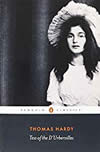 Tess of the D'Ubervilles by Thomas Hardy (October 2014)
Tess of the D'Ubervilles by Thomas Hardy (October 2014)
On the Sybervision and BBC lists - I am very conflicted with this book. First off, it is very well written and easy to read. This is a definite plus in my book. But rereading the summaries of the other Hardy books I had read so far (Far from the Madding Crowd and Return of the Native) I seemed to have similar feelings about them. All of the stories are well written but it is the story itself that I have problems with. First off, this is the best of the three Hardy books so far. But the problem is that Hardy likes to beat down the women in the book until the main character is almost not a character at all, just a plot device to drive the story forward. The story starts off with a peasant family by the name of Durbeyfield finding out they are actually descendants of the "great" house of D'Urberville. This gets them really nothing; however it propels the family forward into trying to get something from it and this is where the trouble starts. Tess is sent to another D'Urberville family thinking they are related, but in actuality they just took the name for prestige and she ends up getting pregnant out of wedlock. Her life is essentially ruined because of this but throughout the book there is a very interesting dynamic as many of the main characters are forced to face the harsh realities of Christian dogma and stigmas of the times. I found the way that the characters reacted to be rather truthful and interesting. Another problem I had was the pacing of the story, where the story would be traveling along and then suddenly something would happen. It was often jarring throughout the story where the big events often felt rather forced. But part of these jarring instances was that the author would repeatedly bring back characters and ideas hinted at earlier in the book to play more pivotal parts later on. I did rather like that approach though. Overall, I would say that the story isn't "great" but it is a pretty good read and made me think a lot, which is not always a bad thing.
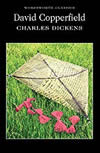 David Copperfield by Charles Dickens (January - March 2013)
David Copperfield by Charles Dickens (January - March 2013)
On the Sybervision, Observer, and BBC lists - This was one of the longer books I have read in a while and I did greatly enjoy it. I found myself wondering what was coming around every turn of the story. Although, after reading the "review" that was found at the end of my version I did notice some rather odd things about the story. Mainly, the first part of the book felt very, very different from the rest of the book. The first part was rather dark and things kept getting worse and worse for David. Once that portion was past though, the book seemed to level out and although there were some bad times, there was nothing quite like that first part. Another thing that has me confused is on the title itself. The story is named after the primary character, David, who for one doesn't go by "David" for the majority of the story. Also, the story focuses more on the supporting characters than on David himself. I felt I was watching the lives of the secondary characters pass through, rather than seeing the story change by any actions of David himself. The story itself was very well written and I was surprised that characters that seemed to be one-note characters would constantly reappear later in the story. Many of these characters did get tiresome, they eventually did redeem themselves by the end. The story itself is easy to follow and well written and I must say this was the best Dickens' story I have read. By the end of the story, I did feel that some of the character arc conclusions left a little to be desired. But overall, the story was well done and I would have to recommend people pick it up.
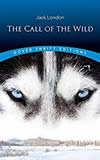 The Call of the Wild by Jack London (September 2005)
The Call of the Wild by Jack London (September 2005)
On the Sybervision and Observer lists - When you think about one of Jack London's Alaskan dog books, you would likely think about White Fang, I assume due to the popularity of the movie a few years ago. However, before White Fang was published, London published the much shorter The Call of the Wild. To start off I must say that this book was fantastic and I highly recommend it to anyone, especially dog lovers. It is gripping and intense, so much so that it makes you want to read more. And to top it all off, its short, only about 80 pages. I was able to read it in about 2 days without trying very hard. It is about a dog, Buck, who was kidnapped from California and taken to Alaska to be a sled dog. The book is entirely through the dogs perspective but it does not have any of the cheesy "dog voices". Not once do you hear what they are saying but you get how he is feeling, especially among his interactions with other dogs and humans. Again I highly recommend, you won't be disappointed.
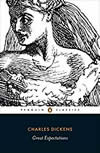 Great Expectations by Charles Dickens (2004)
Great Expectations by Charles Dickens (2004)
On the Sybervision, Norwegian, and BBC lists - Great Expectations was one of Dickens' last novels, and by far one of his best. The novel follows Pip, a street orphan, as he is saved by a convict and eventually grows up to find love. While reading through the story it can be a bit slow at times but overall the story is well written and easy to follow. This book, along with most of Dickens' other works, also suffers from the eternal optimism that is a hallmark of Dickens writing, however it flows much more easily in this story than in others where it often feels forced. The story tackles many themes including wealth versus the poverty we see Pip start out with, love and rejection, and good versus evil. It is definitely a story with a warm heart at its center, as can be found usually with Dickens.
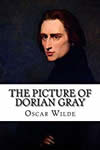 The Picture of Dorian Gray by Oscar Wilde (July 2009)
The Picture of Dorian Gray by Oscar Wilde (July 2009)
On the Sybervision and Observer lists - The Picture of Dorian Gray is a rather enjoyable book about a man who (unintentionally) sells his soul so that he may remain the Adonis that he is forever. Dorian Gray starts out pretty naive until he is told by a painter that he is the most beautiful person he has ever seen. After the portrait that he paints is complete, Dorian sees it and realizes that the painter is correct. At the same time he meets another man, Lord Henry, who says that it is a pity that he will lose his beauty at such a young age, prompting Dorian to sell his soul to maintain his current appearance.. Since that time Lord Henry had steadily corrupted Dorian, acting as a Satan character, leading him down a dark path. Fantastic book. The ending is perfect and unexpected. I recommend it to anyone interested in a fairly short, enjoyable read. Wilde does go off on some tangents at times and some of Lord Henry's speeches are difficult to follow, but enjoyable nonetheless.
Tragedy
 Lord of the Flies by William Golding (March 2025) [Book #187/305]
Lord of the Flies by William Golding (March 2025) [Book #187/305]
On the BBC and Observer lists - This is one of those books I would classify as your standard middle school novel, that I however was never tasked to read. Even though I had never read this before, this is one of those stories that has permeated society to the point that many (most?) people could give you a generalized overview of the story. The story follows a group of boys who are stranded on a deserted island and how their "society" degrades from there. What I was not expecting, but makes sense, is that this is a dystopian novel about essentially the aftereffects of a nuclear war. Comments had been made almost in passing throughout the novel, but it was interesting how the reader is bounced around between some hopeful characters interacting with those who "know" more about what has been going on in the world. On top of all that is just the general fall of society into barbarism with certain members of society fighting back against it with rules and those members losing over time to the more aggressive, violent members of society. I found the debates between the different members of society to be the most interesting, since these are life and death debates in their world and yet also brought down to a child's level. Absolutely wonderfully written. It is so easy to fly through the story (it being extraordinarily short helps), and it is gripping. I flew through the whole thing in less than a week and read half of it in about a day. It was also much darker and gruesome than I was anticipating for a story where children are the focus. There is some notable geological problems with the story, which also gets me giddy all over. However, overall, this book was a lot of fun and one that I would highly recommend.
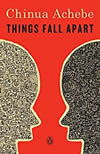 Things Fall Apart by Chinua Achebe (April 2018)
Things Fall Apart by Chinua Achebe (April 2018)
On the Observer and Norwegian lists - Before ever reading this book, I was enamored by the title. Things Fall Apart is a truly fantastic title because it encompasses a whole lot of information with only three words. The story is also incredibly short, taking me less than a week to read with my version (the Everyman's Library hardcover) only having 180 pages. For the book itself I am terribly conflicted on how I feel. The first half of the book deals with the main character, Okonkwo, who lives within a tribal village in Africa. This story is his story, and we get to see life primarily from his point of view. My first problem though, is that he is a horribly unlikable character, however this could easily be a cultural thing. Within the story we witness Okonkwo's life from his perspective, where he routinely beats his wife and children and usually it is no big deal. There are times where he does get in trouble for it, but mostly because he does it during a sacred time, not that he actually did it. He also murders a kid early in the story, where it is implied he will see retribution in some form, but it never happens. Looking at Okonkwo's culture in general, it is presented as horribly machismo. If you're not a "man" then essentially you are weak and not worth the ground you will be buried in. I would visualize it as toxic masculinity at its worst, at least from Okonkwo's perspective. However, as you read more and more into the story the reader really gets into their society. It makes sense. And a lot of the things that happen, you as the reader, can go along with and understand. The first half sets up Okonkwo's life and culture and then something happens, which I'm still not terribly sure how it happened, but Okonkwo is exiled for seven years for manslaughter (essentially). And it is at this time that things start to "fall apart". And here is where it really starts to get interesting. I was under the impression while reading the first half, that this story would focus entirely on this African tribe but shortly into the second half of the story we are introduced to the 'white man', whom not many, if any, of the tribe have ever seen before. The white man ends up bringing his church with him and slowly lures people away from their culture, to the point that local tribesmen are doing things that are horrific to their former beliefs.
And this is where I am conflicted. On the one hand, I don't like the main character as a person. But on the other hand the church here is much worse. They basically condemn these people to death in many instances because the church obviously knows better. Not all of the church people are bad, but the good one in the story goes away and much worse people take his place. The reader can easily see that it is the church that basically dismantles this tribe's culture and society. You feel for these people and when 'everything falls apart', it's heartbreaking. The writing style of this book is actually fantastic. It is incredibly easy to read, which is remarkable since it was written in English, the author's second language. It does take a little while to get used to the names of the people, since many of them are written in similar styles, so piecing them apart to discern who is who takes some time. But I caught on fairly quickly. It's similar to Russian writing in this way. Overall, should you read this? A definite yes (I think). It's not a feel good story by any means, but it is an important one. It is a story about the death of a rich African culture, where the reader truly feels that culture, and watches it slip away from them. Where some of the people stand up to fight this change, and they are the ones who are quickly put down, leaving only this new system behind. Heartbreaking to say the least, but important to understand.
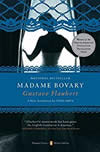 Madame Bovary by Gustave Flaubert (April 2010)
Madame Bovary by Gustave Flaubert (April 2010)
On the Sybervision, Norwegian, Zane, Observer lists - The first thing I noticed while reading Madame Bovary was how well is flowed. One idea flowed into another, most of it without a break or pause. Seemingly unconnected thoughts were put together seamlessly in a string of narrative that I could only hope to replicate. I loved reading this book, especially after The Canterbury Tales, since the language was so much easier to follow and I'm not trying to decipher what the author is saying, I'm just enjoying the words. I did have some problems with the book though. The first being the very weak female characters, especially the main character. She seemed mostly to be reacting to events in her life and not being proactive in any of her choices. Nothing she did was really in response to what she wanted and more in response to what someone else wanted. And her child was the most useless of characters, almost inconsequential for 99% of the story. So, even though it did have some weak points, it was a marvelously written story and I would definitely recommend this as a must read.
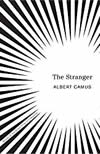 The Stranger by Albert Camus (October 2007)
The Stranger by Albert Camus (October 2007)
On the Norwegian List - The Stranger is a very short and easy book to read, which I was able to finish in just a couple of hours. But that does not mean it cannot be a meaningful book. The story is written in the first person narrative about a man who is so self absorbed that he feels little or no emotion through everything that happens to him and does not realize most of his life is passing him by. The story starts with his mother's death, of which he never shows remorse for and becomes one of the reasons for his downfall in the end. Eventually, the main character is led to murder another man and his moral qualities, or lack there of, are his deciding factors. He eventually realizes his personal flaws but by then it is too late. The book is written in the "American" style that I so particularly enjoy. Short, crisp sentences that are easy to read and easy to understand. I am going to put this on my must read list because not only is it enjoyable, it also provides a pretty good life lesson.
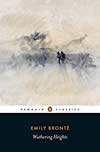 Wuthering Heights by Emily Bronte (May 2006)
Wuthering Heights by Emily Bronte (May 2006)
One of the 2 on all 4 of the 100 lists (Observer, Norwegian, BBC, and Sybervision) - Wuthering Heights ended up being a very weird book and not at all what I expected. I initially considered this to be one of those "chic lit" books but I couldn't have been more off. This is one of the most depressing books I have read yet. The book explores how Satan himself can sometimes corrupt people into being wretched human beings, but in the end sometimes they are able to pull through. Most of the story takes place as a flashback of one of the former housekeepers. It is a little confusing and not very enjoyable at first because of the erudite language Bronte used, but after a few chapters I got used to it. After the flashback it shows an orphaned child, Heathcliff, brought back to the house and is shunned by everyone. However, Heathcliff eventually takes over everything. Since most of this is known at the start of the story, it is interesting to see how everything comes about and to see how two separate families who differ in everything (intelligence, strength, and health) intermingle. This book is definitely on my must read list and it should be on yours.
 Crime and Punishment by Fyodor M Dostoyevsky (1999)
Crime and Punishment by Fyodor M Dostoyevsky (1999)
On the Norwegian, Sybervision, and BBC lists - After reading Crime and Punishment, Dostoyevsky went straight to one of my favorite authors. The book follows a man who feels he can commit the "perfect murder". Unfortunately, his guilty conscious gets the better of him and after a long, agonizing reflection period he is eventually caught and punished for his crimes. The writing was excellent, and the story gave us every little nuance in the character's subconscious during the whole ordeal, from planning to regret. This book also illustrated to me that Russian actually translates very well to English, where I have rarely had difficulty in understanding a Russian-to-English translated work, and it has made Russian writers usually some of my favorites. In actuality, my only problem with the book is the epilogue, which is so out of place in the story that it is obvious it was added afterwards because the publishers were unhappy with how the original story concluded. To get the full impact of the story a reader may just want to not read that section, in my opinion. This is a definite recommend in my opinion.
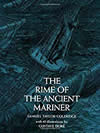 The Rime of the Ancient Mariner by Samuel Taylor Coleridge (April 2012)
The Rime of the Ancient Mariner by Samuel Taylor Coleridge (April 2012)
On the Sybervision list - Before I started this book, I was expecting something in "Old English" similar to Beowulf and Shakespeare, neither of which I really enjoy all that much. However, this was much different. It is written in the Old English style but in such a way that it it understandable for the most part, although I admit I did have a little difficulty with the beginning. This was the fastest read I have had on my list to date and I can't imagine anything taking less time. I read this in about 20 minutes and while I was reading it, I found that I needed to say the words aloud to better understand them. This started as mumbling the words and eventually with me proudly stating all of the lines with gusto. Simply, the story was about a mariner who kills an albatross while sailing around, dooming all of his shipmates. I found the story very well written with a good moral; don't bite the hand that feeds you. Overall, a definite recommend.
Political Commentary
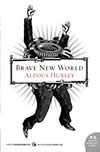 Brave New World by Aldous Huxley (August 2019)
Brave New World by Aldous Huxley (August 2019)
On the Observer and BBC lists - Brave New World can be pictured as the original dystopian-future novel. Written in 1931, Brave New World envisions a world 600 years in the future where the principles of Henry Ford, of the Model T fame, have been taken to the extreme with human beings being produced on assembly lines and natural birth almost all but eliminated. It is definitely a unique view on the future I had not anticipated. Having seen many dystopian movies and read other dystopian novels this was interesting to go back and look at what the future looked like from a 1930's perspective. The "advanced" technology is exactly as you would envision 1930's "advanced" technology to be, kind of steam-punkish, not the technology of today. And it is less technologically advanced as more biologically advanced. In this future they have perfected making a society were nobody wants more in their station of life, by making sure people manufactured for their particular station. This means that many people are dumbed-down to feel better in more menial tasks and some are allowed to excel beyond these menial tasks. The story shows us how a kid who grew up in the "savage lands", a reservation exempt from this "utopia", would feel in such a land and how this utopia. Although referred to by the derogatory term of "Savage", I believe Huxley's point was to portray him as one of us thrust into this "utopia" of sorts and how we would feel in such a world. I would say my only major gripes with the novel was his depiction of women, who were essentially relegated to being sex-hungry, mindless, pieces of meat added as something for the main character to "deal" with, not as characters in their own right. But other than that the story was intriguing, wholly engrossing, and flowed nicely. I breezed through the novel much quicker than I was ever anticipating. I would definitely place this on my recommend list.
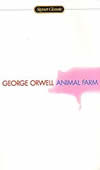 Animal Farm by George Orwell (1996ish and February 2007)
Animal Farm by George Orwell (1996ish and February 2007)
On the BBC list - I had read Animal Farm in high school, like so many other great books, but I was able to go back and reread it as part of my official 100 Greatest Books read through. I find this novel fantastic and insightful, especially knowing what I know now about communist Russia and society as a whole. The book is very fast paced (I read it in about 2 hours) and it's a fun read. The story is like a children's book, which had been forced through a harsh realism filter. In essence, the story is about a group of farm animals who find that their Master has gone over the line one too many times and they take over the farm. They run the farm well as equals (at first), but then dissension starts to appear when the two "leaders" start to fight and one ousts the other from the farm. Orwell's portrayal of communistic society is chilling and he makes it understandable both to the point of how this can happen and why people let it happen. The concept of the book can be generalized in these famous lines near the end: "All animals are equal. But some animals are more equal than others." Definitely on my must read list.
 1984 by George Orwell (February-March 2007)
1984 by George Orwell (February-March 2007)
On the Norwegian, Observer, and BBC lists - Out of the four 100 Greatest Books lists, there are only a few books that appear on more than two lists. 1984 is one out of the few on multiple lists and I can understand why. 1984 is a very powerful novel dealing with possible totalitarian future society and how one might survive in such a society. The only problem I really had with this book was the utter hopelessness of it. Through every page, every paragraph of the book, you had this hope that everything may be ok and that everything turn out right in the world again. Unfortunately, after all is said and done, you knew that it wouldn't. Although this is a fascinating book to read it is very depressing but I must say that it is a definite must read, if only to warn people just might be possible. Because, well, you never know.
Children's
 Watership Down by Richard Adams (April - September, 2014)
Watership Down by Richard Adams (April - September, 2014)
On the BBC book list - I had read Watership Down over a six month period to my daughter, reading about 4-8 pages a few nights a week. It is a long book to read like that but overall the story was straightforward enough that I was able to do this. There were not a lot of twists and turns that would require extensive knowledge of previous parts of the book to make sense of the ending. In general, the story follows a group of rabbits that leave their home due to the psychic feelings of one of the rabbits. They eventually make their way to a new home but realize that they don't have any female rabbits and need to recruit some of them as well. Although, this is a simple story it is by no means bad. I really loved the way it is written. The descriptions given throughout the story are fantastic and you really get to feel for these rabbits with their struggles. The story is gripping and you really do not know who is going to live and who is going to die. How might they get out of a certain situation? And even though many things that happened would be out of the ordinary in a rabbit's world, the author set it up so well that it made sense in the story. I enjoyed how the author treated the different species as well. Mostly, if an animal was a different species the language would appear broken to the rabbits since that was not their native tongue. It really isolated them from the rest of the animal kingdom but also set up some opportunities for these rabbits that other rabbit groups would not have thought of. Overall, this story is often referred to as a children's book, probably because it is written at a junior high level and also, it is about rabbits. I would not pigeon hole it, though. This is probably one of the best books I have read in the last few years, and if I was not reading it with my daughter, I probably would have finished it within a few days. A definite recommend.
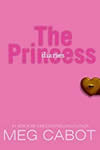 The Princess Diaries by Meg Cabot (January - February 2013)
The Princess Diaries by Meg Cabot (January - February 2013)
On the BBC book list - I was hesitant initially about The Princess Diaries because the last few children's books I have read on this list have really fallen flat for me (I'm looking at you Jacqueline Wilson). But I was pleasantly surprised by this one. The entire time reading it, I kept picturing Anne Hathaway, since she was the one who portrayed the princess in the movie, but I have never actually seen the movie myself. The premise of the book is that this high school freshman girl refuses to talk out her feelings, so she is told by her mother to keep a diary, which is what the reader is actually reading. Along the way she learns that she is actually a princess of this small country no one has ever heard of (because it is made up). Although it could have turned out bad, the story actually works. I found myself feeling for the characters and actually enjoying it. You want to root for the underdog (the best friend's brother) the entire time and you really believe that this is a story that could actually have taken place. This is one of the few books I have read with my daughter where I wanted to go find out what happens later (of which I could pick up the sequel books if I so chose). Overall, I liked the writing style and it is a rather fun book to read, I recommend it.
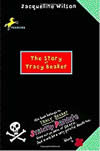 The Story Of Tracy Beaker by Jacqueline Wilson (June 2012)
The Story Of Tracy Beaker by Jacqueline Wilson (June 2012)
On the BBC book list - Following the trend of reading the children's books on the list with my daughter we have the first of the Jacqueline Wilson books on the list (of which there are 4). This book is about a girl who lives in an orphanage waiting for a family to foster her. It is told in the first person as a journal that Tracy (the main character) is writing. Actually, I found this book to be very good in the context of a children's book. It shows that children in orphanages are not all broken and that it hardens children to the reality in which they live. They are often rude, aggressive, and troubled, not because they are bad children, but because the situations make them that way and even with those problems they are still good kids. This book is an alternative take on what you would expect from the given situation and not one you would expect. Her mother abandoned her after the mother's boyfriend beat Tracy, hence the reason she is in the orphanage. She was fostered by 2 homes, beaten by one and the other had their own baby, so she had to leave. Based on this premise you would expect something different than what is presented in the story, but you don't. You get a heartfelt story about a girl who misses her mom and understands that sometimes life sucks. But you take what you can out of it. A definite recommend for the children's books.
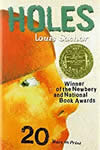 Holes by Louis Sachar (December 2010)
Holes by Louis Sachar (December 2010)
On the BBC book list - I had a preconceived notion about this book because I saw the movie a few years ago and rather enjoyed it, making me feel like I would enjoy the book as well, and I was right. The movie followed the book rather closely, but it still had been long enough since I saw the movie that not everything was as obvious to me while I was reading through the book. The story is well paced, often bouncing back and forth between the past and the "current time", always making it clear what time you were in. My favorite thing about the book is that there wasn't one wasted part of the story. Anything mentioned in the historical context actually came back up in the present context, even when you wouldn't have thought of it. Overall, I would list this as one of my must reads because not only is it a fun story, I feel it was very well written and actually displays a very good moral lesson.
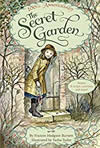 The Secret Garden by Frances Hodgson Burnett (September - October 2010)
The Secret Garden by Frances Hodgson Burnett (September - October 2010)
On the BBC book list - For a children's book, this was not what I was expecting. I was expecting more of the same from what I have read in my daughter's other books including some of the ones on this list. However, The Secret Garden was actually very good. The lessons that the story espouses we remarkably poignant, demonstrating that children are not a product of their birth, but more a product of their upbringing. And that children who seem completely lost to the point that nobody could care for them, somebody still might and bring that child back from the brink, resulting in a normal, happy, and fulfilling childhood. I would have to recommend this to any parent and child as a lesson in how to view life. Although the parts about the "magic" did seem a bit too preachy for my taste, it was not over-the-top.
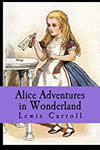 Alice's Adventures In Wonderland by Lewis Carroll (August 2010)
Alice's Adventures In Wonderland by Lewis Carroll (August 2010)
On the BBC and the Observer book lists - In one word, this book was "bizarre". This is the first time I have read Alice's Adventures in Wonderland, but I have seen both the Disney and Tim Burton versions, and both of them made more sense than this book. As my friend put it, that must have been some good opium he was on when he wrote this. The story jumps around randomly and it goes from one situation seemingly into an entirely different situation with no rhyme or reason to why. But when you think about it, it makes sense. This is a story about a dream. But it is also a story as described by a child. So you have a dream where things have a habit of just happening in the words of a child who often will jump around and make up things that don't really make any sense, all woven into this magical land where nothing makes sense and things just happen. Although I was greatly dumbstruck at first, the story began to grow on me. Nothing really happened in the story by the end but aren't most dreams like that. At one point, you just wake up. The book is very well written. It just flowed as I read it, with each sentence and each section flowing into the next. Although you knew the situations didn't fit together the narrative was never jarring between different parts. The sentences weren't choppy and it made for a rather enjoyable read to see what would happen next. So I will place this on my to read list, mostly due to the fun that reading the book could instill on a child or an adult who wonders what it is like to think like a child.
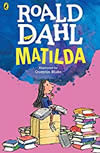 Matilda by Roald Dahl (July 2010)
Matilda by Roald Dahl (July 2010)
On the BBC list - I rather enjoyed Matilda a lot (my daughter and and I both did). I found this to the best of the Dahl books that were on my list. The story was nice and linear, as opposed to several of his other books which seemed to be more disjointed. The characters were also some of his best and actually made you care about what happened to some of them, which is one sign of a good book. I loved how the story tied up very neatly at the end and how aspects of people's personalities came back in a rather surprising (at least to me) way. The story is about an extremely intelligent 4-5 year-old girl named Matilda. However, she happens to live in a house where her parents don't think anything is possible out of the girl and her school's headmistress hates children. So life kind of sucks for her. But she does have a teacher who goes to bat for her and in return Matilda not only helps the teacher out of a bad situation but helps herself as well. The morals of the story are great and at many points in the book I actually got rather upset at several of the characters. Another great thing about this book, and most of Dahl's works, are the use of larger words. Words you wouldn't typically find in children's books. He uses them in such a way that they fit into the context of the story and the person is able to understand the meaning of the words, just by the context. Matilda is another Dahl book I will add onto my personal Greatest Books list, and actually I think it should be ranked higher than Charlie and the Chocolate Factory.
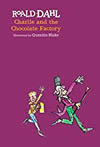 Charlie And The Chocolate Factory by Roald Dahl (June 2010)
Charlie And The Chocolate Factory by Roald Dahl (June 2010)
On the BBC list - Charlie and the Chocolate Factory is so far my favorite of Dahl's works, and likely to remain that way. I had grown up on Charlie, having seen the original movie countless of times and I actually believe I read the book growing up too, although I couldn't remember any of it. Unlike Dahl's other works, which seemed scattered and more like many mini stories with a common theme, Charlie and the Chocolate Factory was a cohesive story with great characterization and a fun read. It was also interesting to compare the two movie versions of the book with the book. Despite my love of the original movie it appears that both of the movies had parts that followed the story very closely and both had parts that diverged from the story a lot, however they were often in different places. Overall, a fun, cohesive story, that is a definite must read on my list.
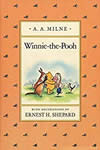 Winnie-the-Pooh by AA Milne (July 2006)
Winnie-the-Pooh by AA Milne (July 2006)
On the BBC list - Winnie-the-Pooh is one of those stories that had pervaded my childhood. From the movies to the cartoon series, I was (and still am) absolutely in love with Pooh Bear, despite never having read the books. And I am sure that the reason this is on the BBC 100 Greatest Books (which is basically a popularity vote on books) is because of the cultural inundation of Pooh. That being said, I still really enjoyed the book. It brought back many good memories from all the movies and shows which took their plots many times directly from the books. The book is set up with each chapter containing a different adventure with Winnie-the-Pooh and his friends in the Hundred Acre Woods. This is how so many books can be created from the one original book. Each chapter is often broken out and made into a unique book, or cartoon, or movie. Within the stories, A.A. Milne talks to the reader in such a unique way that the language he uses could be considered as poor in other instance but in this instance it feels endearing. I found the best stories to be some of his earlier works in the book, which also ended up being some of the shorter chapters. As the chapters/stories got longer, A.A. Milne's particular use of language didn't seem to work as well. However, overall I would definitely recommend this book, especially for the kid in all of us.
Non-Fiction
 Walden by Henry David Thoreau (November - December 2006)
Walden by Henry David Thoreau (November - December 2006)
On the Sybervision list - While most of the books on my lists are strictly fiction, there are a few that delve into other aspects of history such as scientific and philosophical works. Walden was my first dip into these other, more intimidating, works of literature. And when I started this book I was expecting a rather long, dry, dull book, but in the end, I was pleasantly surprised. Although this is listed as a philosophy book, it reminded me much more like an amateur scientist exploring the world and describing what he sees. Walden is written in a language that is poetic and enjoyable to read where Thoreau will often comment on aspects of his society that are still prevalent today; including helping the needy and people living just to make money. The premise of the book is that Thoreau wanted to live outside of society, with no reliance on it and in the end he succeeded, for the most part. This work impacted me so much that a line within the story has become my email tag since reading it:
"I went to the woods because I wished to live deliberately,
to front only the essential facts of life,
and see if I could not learn what it had to teach,
and not, when I came to die,
discover that I had not lived."
I feel that for an educational experience this book should definitely be on everyone's list.
